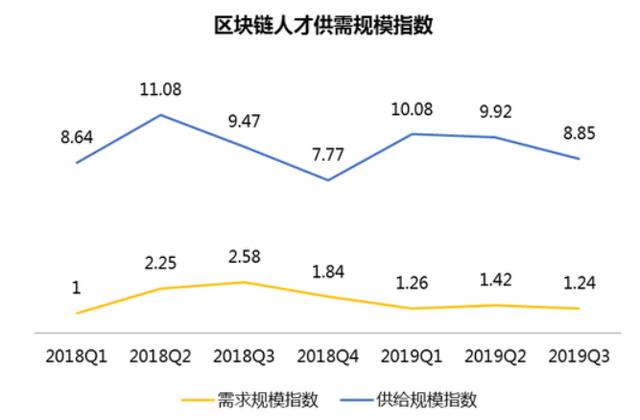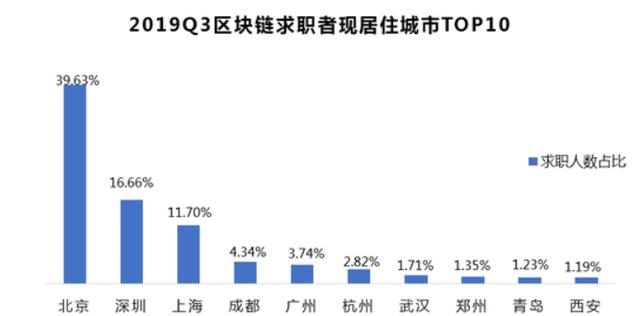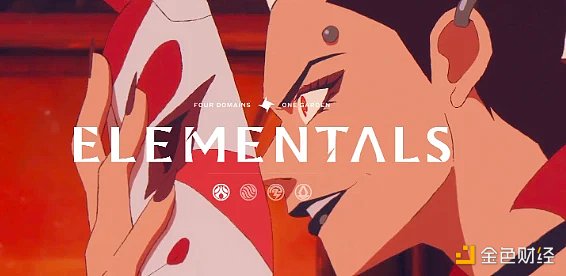The truth about blockchain employment: higher thresholds, fewer job applicants, high salaries or history?
 Author: Fuji do
Author: Fuji do
Source: Deepchain
"I have been in business for 37 days," a blockchain practitioner complained. "I don't expect to find another job in the blockchain industry."
"In this industry, the salary is not high, and the requirements are quite a lot."
- Beginner's Guide: Five dimensions to take you through the chaos of the blockchain
- Singapore government-backed accelerator Tribe announces $ 15.7 million funding to support blockchain startups
- Blockchain redemption guide: stay away from speculation and cultivate value awareness
"It's nothing compared to the previous two years."
In the early years, there were countless practitioners who chose to flood into the blockchain, while gaining cognitive dividends, it also brought prosperity to the industry.
But now, once prosperity has returned to calm, once practitioners are somewhat helpless at this time.
Some people who have already entered the blockchain industry have started to leave, and those who want to enter the blockchain industry are somewhat more interested than before.
Why did the people leave? Why would anyone want to come in? What are the plans of the people still inside?
What is the employment truth in the blockchain industry?
"Geographical misalignment of talent and company"
"Although compared with the past, the talent gap in the blockchain industry is much smaller." Lin Xiao (pseudonym) said, "but basically new blockchain posts are released every day."
Lin Xiao operates a blockchain job hunting group. For a long time, almost every day, a blockchain company asked her if she could post recruitment information in the group.
According to the 2019 Blockchain Talent Supply and Demand and Development Report (hereinafter referred to as the "Report") released by Zhilian Recruitment, although the industry rectification has cooled job seekers' enthusiasm, the blockchain field has long attracted job seekers. In the eyes, the supply scale is much larger than the demand. In the first three quarters of 2019, the number of job seekers on the blockchain was 7.12 times the number of recruiters.

"There are also many job seekers in the group, and there are also many HR." Lin Xiao told DeepChain: "But the effect is actually not ideal."
Lin Xiao believes that geographical factors are a very important factor that leads to unsatisfactory job search results.
"The job hunting group publishes job hunting information more often in blockchain companies in Guangzhou, Shenzhen and other places." Lin Xiao said that the number of companies in the group is currently around 60, of which about half of the work locations are in Beijing.
"But the number of Shenzhen companies is increasing." Lin Xiao said.
The "Report" shows that in the third quarter of 2019, in the distribution of blockchain recruitment cities, Shenzhen, Shanghai, and Beijing were in the first echelon, and the proportion of recruiting people reached 21.07%, 16.07%, and 13.9%, respectively. Guangzhou and Chengdu followed After that, they accounted for 5.79% and 5.34% respectively.
Among them, Shenzhen's recruitment demand increased by 5.06 percentage points compared with the same period last year, surpassing Beijing and ranking first. In contrast, job seekers are mainly concentrated in Beijing.

"Compared with previous years, there are more blockchain companies in Shenzhen this year." A blockchain media person in Shenzhen revealed to DeepChain: "Mainly there are more exchanges."
At the same time, the HR of another Shenzhen blockchain company said that about 60% of their employees came from surrounding areas such as Shenzhen or Guangzhou, and a considerable part from Beijing, Shanghai and Hangzhou.
"Unlike Shenzhen, 95% of employees in Chengdu's blockchain companies are from Chengdu and its surroundings." The human director of a blockchain company in Chengdu told DeepChain: "In Chengdu, every year from first-tier cities Returning Southwestern employees, and in addition some foreign employees chose to stay for the happiness index of Chengdu. "
The director of human resources stated that considering the time cost and opportunity cost, it is more difficult to recruit blockchain talents directly from the field.
"How difficult is it to recruit in cities like Shenzhen and Chengdu than Xi'an?" A founder of a Xi'an blockchain company complained to DeepChain. , You can only recruit under the banner of Internet companies. "
Interestingly, the founder was an early blockchain practitioner in Beijing.
"After accumulating some experience, I decided to go home and start a business." The founder believes that there are too many talents in Beijing and it is difficult for him to get ahead.
"Treatment is not as high as expected"
"Don't look at the talents in Beijing, but not many find jobs." A Qiang (pseudonym), an employee of a blockchain company, told DeepChain.
A Qiang said that the threshold for finding a job has now been raised. When he was looking for a job, he was rejected twice by the blockchain company because of poor school and lack of experience.
Although Aqiang found a job in the blockchain industry after that, he was still worried about being rejected twice.
"I graduated from 211. I previously worked for one of the HOBs. Saying that my school is not good and lacks experience. Does it make sense?" A Qiang was angry.
In addition, Xiao Wang (pseudonym), the head of a traditional media business, also said that he had interviewed four blockchain companies, and all of them were rejected because of lack of experience.
"Also do business, isn't the business of the blockchain and the business of the traditional field different at all?" Xiao Wang asked DeepChain.
In addition to raising the barrier to entry, Aqiang also made a new discovery during the job search process, that is, the salary of blockchain posts is not as high as expected.
According to the "Report", in the past two years, the salary in the blockchain field has fluctuated around 16k per month, which is significantly ahead of the national average. The "Report" believes that this is also the key reason why the talent of the blockchain industry is so attractive.
"To be honest, except for the technical staff, I don't think most people find the blockchain industry so attractive." A Qiang said that except for technical developers who can get the expected salary, other positions rarely get recruited at the time of recruitment. Fang promised wages.
"Indeed, the salary in the blockchain field is not as high as expected." For Wang Qiang's point of view, Xiao Wang gave the same affirmation: "At least not as high as said online, generally 30% lower."
"In addition, the blockchain industry also has a feature that except for technical staff, other positions are basically replaced anytime, anywhere." A Qiang told DeepChain: "Like some project parties, during the mainnet launch phase, temporary high salaries will be paid. Hire a copywriter or something, and when the announcement is over, you will find a way to get rid of it. "
"There is no sense of security." For the work in the blockchain field, A Qiang said.
"Experience and education are increasingly valued"
A Qiang and Xiao Wang believe that the blockchain salary is not as high as expected, but some people have put forward different opinions.
"If the position and personal ability match, you can basically give everyone the ideal salary." Ming Ming (pseudonym), as the human director of a blockchain company in Beijing, believes that the salary in the blockchain industry is higher than the traditional industry.
Obviously recalled that there were many job seekers in the first three quarters, and most of these job seekers were attracted by the high salary of the blockchain industry. However, after in-depth communication, it was found that the ability did not meet the requirements at all.
"Because as the company grows, the barriers to entry for job seekers are constantly increasing."
"There are difficulties in hiring, and this needs to be viewed in conjunction with the current state of business operations and the history of industry development. After one to two years of precipitation, today's blockchain companies want to hire talents with relevant experience." Apparently told DeepChain "It's best to work directly when you come."
"The threshold is mainly experience." The CEO of a blockchain company also agreed with the clear statement.
According to the "Report" data: among the current blockchain talents, 31.77% have 5-10 years of work experience, 23.89% have more than 10 years of work experience, followed by 26.15% with 3-5 years of work experience. 16.79% in 1-3 years, and 1.40% in less than 1 year.
As early as 2018, an article pointed out that in order for early blockchain companies to recruit a suitable candidate, they basically needed to "coax and cheat." What's more, because some blockchain companies have been unable to find suitable candidates, the selection conditions can only be lowered again and again.
"There is no way, neither the boss nor the employees knew the blockchain in the early days." The CEO told DeepChain: "At that time, there were more people who needed to be able to do things. As for how to do it, we couldn't care about it. Now. "
"But now it's different. After going through many twists and turns, the companies that can survive will want to do a good job, and when recruiting, they will rather lack." The CEO said that with the improvement of the entire company structure, the company has Sufficient turnover to interview job candidates.
"We have great patience for talent," said the CEO.
In addition to experience, there is a degree.
According to the "Report", there are generally high academic qualifications for blockchain talents, most of which are bachelor's degree or above, which is higher than the requirements for blockchain talents. Among them, the undergraduate education accounted for the majority, accounting for 56.18%, the master's degree and above accounted for 18.57%, and the college education accounted for 22.22%.
"Blockchain is a new field and new technology. We need highly qualified talents in order to adapt to the ever-changing changes in this circle." The CEO told DeepChain: "In addition, I also have a view on the upcoming blockchain Students with learning experiences have expectations. "
"Bright future for university blockchain talents?"
According to media reports, as early as 2018, more than 10 domestic universities including Tsinghua University, Central University of Finance and Economics, Zhejiang University, Tongji University, Fudan University, and Southwestern University of Finance and Economics have successively offered blockchain-related courses.
Among them, the Central University of Finance and Economics established a blockchain project laboratory in July 2016. This is also the first university in China to offer blockchain related courses.
"We believe that blockchain is a good technology that may have a huge impact on the financial field and is very suitable for students of financial schools." Said Zhu Jianming, a professor and doctoral supervisor at the School of Information Science and Technology of Central University of Finance and Economics.
Not surprisingly, after two to three years, these college talents who have learned the blockchain knowledge system in schools will officially enter the blockchain market.
"I think that students who are professional counterparts will be very popular. The market gap for talents in the blockchain industry is still very large." As a manpower of the blockchain company, he clearly gave his opinion: "After the professional course guidance of the university , More seamless after work. It does n’t take much training time. "
Interestingly, the clear statement was opposed by job seekers from the blockchain. Some job seekers said that the blockchain knowledge learned in the school was too "stiff" and difficult to adapt to the rapidly changing blockchain industry.
Regarding this statement, a college student at Beijing Institute of Technology expressed his approval. He believes that to truly understand the blockchain, one must enter the blockchain in person. Understanding the blockchain from books alone is tantamount to tickling.
"From the perspective of domestic university blockchain talent training, it is still in the stage of knowledge popularization." Zhu Jianmin said.
The college student also said that at present the school only offers blockchain courses, but there is no major in blockchain. In his opinion, to a certain extent, students only regard the blockchain field as one of the future employment directions, and they will not be limited to the blockchain field.
However, some students are very optimistic about the blockchain and include it in their career plans.
"I will find a job in the blockchain after graduation." A college student at Central University of Finance and Economics stated that he would use his strengths in the blockchain field: "No technology, focus on the financial field."
It is worth noting that in addition to college students, there are many outside-industry talents who have received blockchain training through traditional Internet training institutions or colleges established by various blockchain companies.
"The past two years have been hot, and this year seems a bit cold." A head of a blockchain training institution told DeepChain.
Before Xiaobai wanted to come in, at least he had to know what a blockchain is. It is useless to know what a blockchain is now. The person in charge said that after listening to his trainee feedback, he still couldn't find a job in the blockchain industry after receiving training.
"There are still a few who really enter the blockchain."
Interestingly, the person in charge is also ready to leave the blockchain.
"Since this year, fewer and fewer students have signed up to learn blockchain technology." The person in charge finally told DeepChain: "Training can't go on."
"Leave or return?"
The enthusiasm of blockchain job seekers is declining, and the enthusiasm of blockchain practitioners is also diminishing.
"Crisis." A Qiang told DeepChain: "If you choose to leave the blockchain field in the future, the reason must be a crisis."
On October 24, the central government issued a document on blockchain learning. At the same time, however, supervision has been gradually strengthened.
A Qiang said that as the country cracks down on cryptocurrency MLM, the exchanges and project parties that have previously been judged to be MLM will not end well.
"And the employees of these blockchain companies will most likely not be hired by other blockchain companies." A Qiang believes that these people can only choose to change careers.
In addition, someone disclosed to DeepChain that two of his colleagues in the blockchain were persuaded by his family to leave the blockchain because of the arrest of the exchange.
Leaving because of the crisis, such cases are not uncommon in the blockchain industry. In addition, a considerable number of practitioners chose to leave because the expected salary did not meet the ideal requirements.
Some blockchain editors said that the monthly salary of a night editor can reach 15K, but now it is only about 8K. Counting it out, there is not much difference between the salary income of traditional editors. Plus the United States and China are exactly 12 time zones apart.
"We work here, and the United States happens to work, and the information in the United States also needs attention." The editor said that the intensity of work is not less than during the day.
In addition, the field of blockchain requires practitioners to have a certain degree of understanding of computer technology and financial concepts, as well as English.
"With this level, who would like to earn seven or eight thousand a month?"
It is precisely because of the difficulty of blockchain posts that salary is not very high, coupled with the strengthening of supervision. The editor finally chose to leave.
But at the same time, the editor stated that he would return when the dust settles.
Blockchain is an emerging industry, and you don't want to miss the air. This is the reason why the blockchain editor will return in the future.
Coincidentally, Xiao Wang, who had been rejected for several previous blockchain job interviews, finally told DeepChain that he likes blockchain and hopes to appeal to various blockchain companies to give outsiders more opportunities.
"We may not be worse than the wise."
The monthly salary of a blockchain engineer starts at 30K, and the monthly salary of a blockchain operation practitioner starts at 15K. Around 2017, the entire blockchain market opened up its abyss, absorbing talents hungry.
With the development of the industry, the mystery of the blockchain has gradually faded out in front of the world, and the high salary that was once available has now become unavailable.
Some people say, "When the industry is truly mature, the moat is established. Blockchain jobs will be treated in the same way as traditional jobs."
But at the same time, some people believe that as a key development area of the country, there will be a qualitative change in the demand and treatment of talents in the future.
What direction will the blockchain field develop in the future? What impact will it have on practitioners in this field?
At least for now, we don't know.
Today topic:
Why do you stay / leave the blockchain industry?
This article was originally created by Deepchain Finance (ID: deepchain-eva). Reproduction without authorization is prohibited.
We will continue to update Blocking; if you have any questions or suggestions, please contact us!
Was this article helpful?
93 out of 132 found this helpful
Related articles
- Gong Ming: Crypto War, Blockchain Technology Road
- Is South Africa's central bank introducing new cryptocurrency regulations?
- A picture to understand the blockchain: expansion, going to sea, ending, a decade of exchange history
- Analysis | What's the value of Filecoin coming soon?
- Bakkt trading volume breaks 100 times, Wall Street wolf really comes
- How to get a fixed interest rate on your DAI assets?
- Bakkt's transaction volume exceeded 100 times, can Bitcoin become a mainstream asset?






